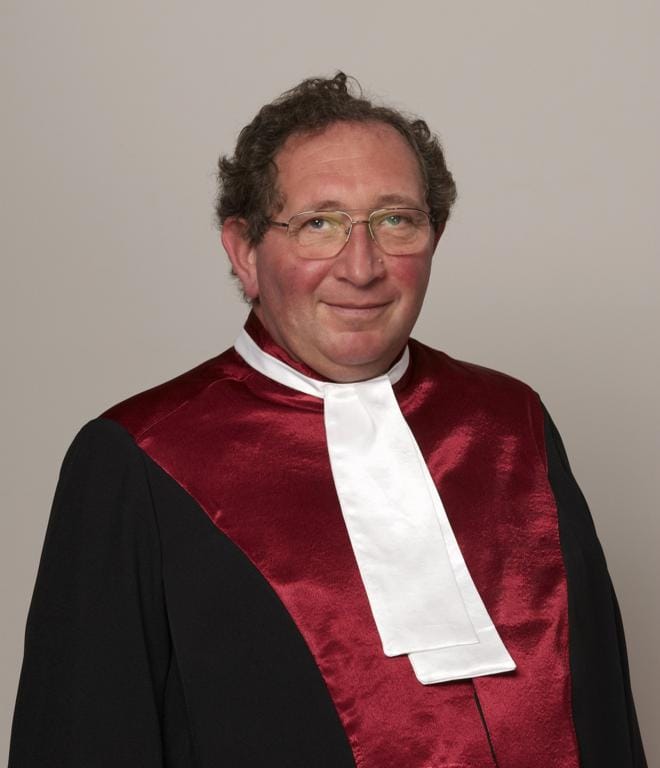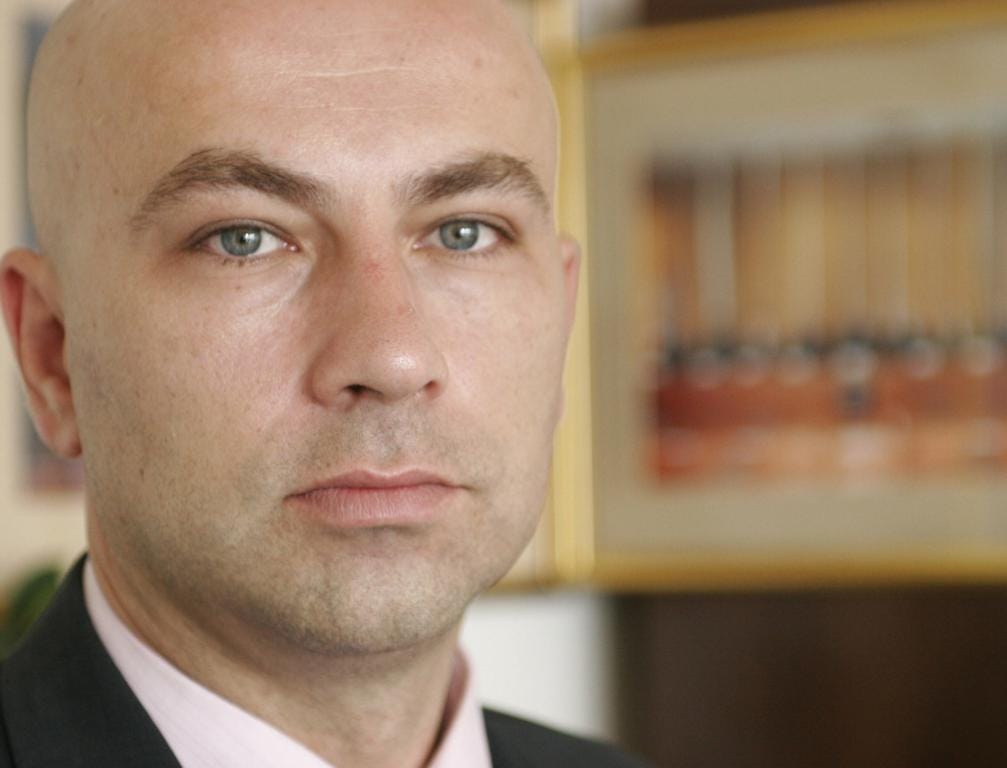Faris Vehabović, a judge of the Constitutional Court of the Federation of BiH (FBiH), is one of several legal experts who say the Constitutional Court of BiH sometimes exceeds its jurisdiction in its rulings.
Vehabović, a former registrar of the Constitutional Court of BiH, says that the Court fact-checks, reviews the legal interpretations of lower courts and acts as a supreme court, which the BiH court system does not have. He says further that the Constitutional Court should not perform these functions and that by doing so acts like an ordinary court of law.
Those involved with the BiH Constitutional Court hold a different opinion. They say that this is a delicate legal issue that deals with subtleties and that it is logical that they consider various legal viewpoints on the issue of the court’s jurisdiction and case law. Yet, they say, they consider the protection of the citizens’ constitutional rights to be their priority.

Zvonko Mijan, registrar of the Constitutional Court of BiH, says that by overturning the verdicts of lower courts, the Constitutional Court’s fault may lie in hurting the vanity of lower court judges, which may trigger criticism.
Mijan explained that along with its basic authority – to uphold the constitution and perform judicial review– the Court also has an appellate authority to review the cases of citizens who claim that the rulings of lower courts have violated their human rights guaranteed by the constitution.
According to Court statistics, the Court admits between 3,500 and 4,000 cases every year, more than 99 percent of which are cases where citizens are appealing lower court decisions.
‘We often come across flagrant violations of human rights which should not be happening’ says Seada Palavrić, president of the Constitutional Court of BiH.
It is in these cases that the court walks a fine line and can easily draw criticism.
Vehabović’s criticism concerns this issue.
‘In my opinion, the Constitutional Court has been a tad too much involved in fact checking, especially in cases involving arbitrary application of the law in lower courts’ rulings’ he said. By arbitrary application, jurists mean applying law without legal basis or explanation of the verdict.
Lack of Supreme Court
However, Vehabović acknowledges that the situation may stem from the lack of a supreme court in BiH. A supreme court would have the authority to standardize the application of case law by lower courts. In the absence of a supreme court, the Constitutional Court acts in its place, he said. ‘If there were a court charged with establishing the case law, then the Constitutional Court would have no justification in dealing with those facts’ he said.

A former judge on the court, Ćazim Sadiković, who is now a representative of BiH in the Venice Commission of the Council of Europe, sees the cause of the problem in BiH’s lack of a supreme court at the state level.
Sadiković says that BiH is probably the only country in the world that has a constitutional but not a supreme court at the state level.
It is necessary to establish a judicial system culminating with a supreme court at the national level ‘because the Constitutional Court cannot successfully operate in these circumstances’ says Sadiković, mindful of the fact that ‘democracies have existed without a constitutional court but not without a judicial system. And the failure to establish a judicial system creates big problems.’
Another critic, Nurko Pobrić, judge of the Cantonal Court in Mostar and a professor of constitutional law, said, ‘The Constitutional Court of BiH is not exceeding its authority directly, but in a subtle way, through a back door saying that it was protecting human rights. That’s how it exceeds its authority.’
Professor Pobrić said that the topic was one of legal nuances.
Vice-president of the Constitutional Court of BiH David John Feldman said that it is always difficult to determine whether lower courts act in an arbitrary fashion. He also said that many cases have led to discussions among the court’s nine justices that revealed differences of opinion among them.
‘The Constitutional Court of BiH has always maintained an attitude that this was not a reason to shut its eyes before mistakes which are denying people their constitutional right to a fair trial’ said Feldman, adding that the Court deems it important to protect citizens from the arbitrary and ungrounded decisions of lower courts.
The Constitutional Court is not called upon to review the establishment of facts or interpretation and application of the law by the lower courts unless their decisions are in violation of constitutional rights, such as a fair trial, access to court, etc.
No Standards Outlined

Mijan said it is a complicated issue because human rights are very broadly defined in the Constitution and the European Convention on Human Rights. The Convention states that everyone has a right to a fair trial, said Mijan, but he added that the convention never sets out what standards should be followed in applying the law.
‘So now, the Constitutional Court is basing its authority on the standards established through the case-law of the European Court (for human rights). But it (European Court) offers only the minimum of human rights’ said Mijan. He added that countries like BiH, which are signatories to the Convention, can offer a higher level of protection of human rights.
In response to those jurists who claim that the court seems to exceed its authority by taking on the role of a court of appeal, Mijan said it is not trying to be an ordinary appeal court. Instead, he said, it decides whether a lower court has correctly established the facts and applied the law in exceptional cases rather than by default. And, he said, the court does that only if the lower courts’ actions led to the violation of constitutionally guaranteed rights.
Mijan said the Constitutional Court never directly states that an ordinary court has misrepresented someone’s statement, but it does examine how the court described it in its verdict. A problem arises, he said, if a lower court has done a poor job of explaining the rationale for its decision.
In a series of decisions, the European Court in Strasbourg stated that a party was unable to exercise its right to appeal to a higher instance court, and that a higher instance court could not review the verdict if that verdict has not been elaborated properly, says Mijan.
Those are legal shadings, he said, and ‘we are aware that the judges dealing with it have a problem because of it.’
As an example, Mijan explained that entity supreme courts sometimes review the lower courts’ decisions without proper elaboration, even in cases where the value of litigation is under 15,000 KM, which is the minimum required by law.
If the supreme court of an entity has ordered the review of a lawsuit worth only 3,000 KM, the Constitutional Court of BiH might receive an appeal claiming that the person’s right to a fair trial has been violated, says Mijan. This has to do both with the establishment of facts and interpretation and application of the law, and if the appellant has complained that his right to a fair trial has been violated, Mijan says, explaining that in a case like this the Constitutional Court can’t just say, ‘Everything is fine, your rights have not been violated.’
He added that this issue should be dealt with on a case by case basis, and that it was good that the court’s rulings have been agreed upon, first by a panel of justices who come up with a verdict that is later checked by a group of the Courts’ legal advisors. Only if they all agree that a decision has fulfilled all requirements is it handed down and published.
Even when the Constitutional Court has exceeded its authority there is no real damage being done, because there is always a higher authority to review the decision, says Mijan; in this case the Human Rights Court in Strasbourg.







